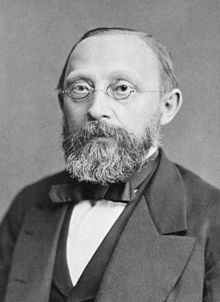鲁道夫·魏尔肖
鲁道夫·路德维希·卡尔·菲尔绍[2](德語:Rudolf Ludwig Karl Virchow ,发音 [ˈvɪrço] 或 [ˈfɪrço]),(1821年10月13日—1902年9月5日),又译魏尔肖、维尔肖、魏爾修[3]、魏修[4]、菲可[5],是德国的医生、人类学家、病理学家、史前学家、生物学家、作家、编辑和政治家。
| 鲁道夫·卡尔·菲尔绍 Rudolf Carl Virchow | |
|---|---|
 | |
| 出生 | 1821年10月13日 |
| 逝世 | 1902年9月5日(80歲) |
| 公民权 | |
| 母校 | 柏林洪堡大学 |
| 知名于 | 细胞病理学 生源说 菲尔绍三要素 |
| 信仰 | None. Agnostic.[1] |
| 配偶 | Ferdinande Rosalie Mayer (Rose Virchow) |
| 奖项 | 科普利奖章(1892年) |
| 科学生涯 | |
| 研究领域 | 医学、人类学 |
| 机构 | 夏里特 维尔茨堡大学 |
| 博士導師 | 约翰内斯·彼得·缪勒 |
| 其他指导者 | 罗伯特·弗罗里普 |
| 博士生 | 弗里德里希·丹尼尔·冯·雷克林科森 瓦尔特·克鲁泽 |
| 其他著名學生 | 恩斯特·海克尔 艾德温·克雷伯 法兰兹·鲍亚士 阿道夫·库斯莫尔 马克斯·威斯坦霍佛 威廉·奥斯勒 威廉·亨利·韦尔奇 |
| 施影响于 | 爱德华·希琪希 查尔斯·斯科特·谢灵顿 保罗·法莫尔 |
| 签名 | |

科学生涯
编辑菲尔绍出身于波美拉尼亚一个中产阶级医生家庭。早年,他依靠奖学金在柏林的普鲁士军事学院学习医学。 1842年毕业时,他并没有如期望的在军队服役,而是到柏林夏里特医院擔任Robert Froriep的助手。1847年,菲尔绍升等教授。然而,两年后因为在公共卫生政策上与普鲁士当局不和, 他被分派到维尔茨堡从事解剖学教研工作。1856年他重返柏林,在他曾经担任过Froriep的助手的柏林大学及柏林Charité医院担任病理解剖学教授(一个专为他而设立的职位)。他对德国医学教育的一个主要贡献是鼓励医学生使用显微镜,并因经常鼓励学生“以显微镜方式思维”而为人所知。
菲尔绍以多项科学发现而闻名. 他是第一个发现白血病的人。他最为人所熟知的理论则是他 1858 年发表的“Omnis cellula e cellula”(每一个细胞都来自另一个细胞)。这一个构想实际是由François-Vincent Raspail最早提出的,然而菲尔绍使其广为人知。这一理论与他的细胞病理学(病理过程中,是某些细胞而非整个器官发生了病变)息息相关。菲尔绍另一著名发现是他对于肺动脉血栓栓塞的形成机制,因而提出了栓塞这一术语。他发现肺动脉中的血凝块是由来自静脉的血栓发展而来,并描述道:「软化的血栓末端脱落下大小不一的小碎片,被血流带至远端的血管,这引起了常见的病理过程,我把这一过程命名为栓塞」。菲尔绍还提出了与这一研究密切相关的“血栓形成三要素”菲尔绍三要素。菲尔绍建立了细胞病理学,比较病理学(对比人与动物的疾病)以及人类学。他创造性的工作上承乔瓦尼·莫尔加尼(其器官病理学曾为菲尔绍所研习)下启Ehrlich(菲尔绍开拓微观病理学时 Ehrlich 正在夏里特医院学习)。
1869年,菲尔绍成立了「人类学、人种学及史前史学会」(Gesellschaft für Anthropologie, Ethnologie und Urgeschichte),这一学会在当时对于德国考古研究的联合与推动有着很大的影响。
他同时还是一名多产的作家,他的著作包括:
- “Mittelheilungen über die Typhus-Epidemie”(1848)
- “Die Cellularpathologie, (1858), English translation”(1860)
- “Handbuch der speciellen Pathologie und Therapie”(1854-62)
- “Vorlesungen über Pathologie”(1862-72)
- “Die krankhaften Geschwülste” (1863-67)
- “Gegen den Antisemitismus” (1880)
他还发展了一套标准的剖检程序并以他的名字命名,是至今仍在使用的两种剖检程序的主要方法之一。
菲尔绍被尊为「细胞病理学之父」。其实证、科学的研究方式为现代医学认识疾病的发生、发展机制提供了有力的工具,对整个医学的发展有过重大贡献。但是,其片面强调局部细胞病变而忽视了机体作为一个整体的反应(神经、内分泌、免疫),对医学的发展带来了某些不利影响。
晚年菲尔绍在学术上日渐保守,曾反对塞麦尔维斯所提倡的手术消毒法。
政治生涯
编辑菲尔绍同时是一名致力于推进柏林公共卫生水平的政治家(历任柏林市议会议员,1861年起任普鲁士议会议员,1880-1893任德意志帝国议会议员),尤其是建立现代化供水及下水道工程的工作。菲尔绍还是提出「社会医学」概念的人,他注意到疾病并非单纯生物性而有其社会性。作为自由主义的德国进步党(Deutschen Fortschrittspartei)的发起人与成员,菲尔绍是当时重要的反对俾斯麦的政治家。
菲尔绍在反教权反罗马天主教会的「文化抗争」(Kulturkampf)运动中则与俾斯麦持同一立场。 [6] 菲尔绍宣称:反教权法案是“为了人性所进行的一场伟大斗争”。 [7]菲尔绍是在就五月法案的讨论中,首次使用了文化抗争这一词语。 [8]
菲尔绍在共济会人士中广受尊崇[9],而按某种说法[10]他可能确实是共济会一员,虽然没有任何官方记录能证明这一点。
医学人类学学会颁发一个以菲尔绍的名字命名的年度奖,即菲尔绍奖。
参见
编辑参考文献
编辑- Becher, Rudolf Virchow, Berlin, (1891)
- J. L. Pagel, Rudolf Virchow, Leipzig, (1906)
- A biography of Virchow at Whonamedit.com (页面存档备份,存于互联网档案馆), including phenomena named after him
- Virchow, RLK (1978) Cellular pathology. 1859 special ed. ,204-207 John Churchill London, UK.
注释
编辑- ^ John Simmons. The scientific 100: a rankings of the most influential scientists, past and present. Carol Publishing Group. 1996: 90. ISBN 978-0-8065-1749-0.
For his abrasive antiroyalist as well as agnostic views, Virchow was made to suffer in the subsequent period of political reaction; his meager salary was cut off and he was effectively dismissed from Charite.
- ^ https://www.termonline.cn/word/234198/1#s1
- ^ https://terms.naer.edu.tw/detail/4c8ca09b72b6a547e8fd0fb444fb1152/
- ^ https://terms.naer.edu.tw/detail/557361a925b504cbe5e9b6057bdcd334/
- ^ https://terms.naer.edu.tw/detail/3be8f2b62dccd13ed7f651bd9ede884d/
- ^ "This anti-Catholic crusade was also taken up by the Progressives, especially Rudolf Virchow, though Richter himself was tepid in his occasional support." Authentic German Liberalism of the 19th Century (页面存档备份,存于互联网档案馆) by Ralph Raico
- ^ "The term came into use in 1873, when the scientist and Prussian liberal statesman Rudolf Virchow declared that the battle with the Roman Catholics was assuming “the character of a great struggle in the interest of humanity.”" from Kulturkampf 互联网档案馆的存檔,存档日期2007-03-12.. (2006). Britannica Concise Encyclopedia . Retrieved March 25, 2006, from Encyclopædia Britannica
- ^ A leading German anthropologist, Rudolf Virchow, characterized Bismarck's struggle with the Catholic Church as a Kulturkampf - a fight for culture - by which Virchow meant a fight for liberal, rational principles against the dead weight of medieval traditionalism, obscurantism, and authoritarianism." from The Triumph of Civilization (页面存档备份,存于互联网档案馆) by Norman D. Livergood and "Kulturkampf \Kul*tur"kampf`\, n. [G., fr. kultur, cultur, culture + kampf fight.] (Ger. Hist.) Lit., culture war; - a name, originating with Virchow (1821 - 1902), given to a struggle between the Roman Catholic Church and the German government" Kulturkampf (页面存档备份,存于互联网档案馆) in freedict.co.uk
- ^ "Rizal's Berlin associates, or perhaps the word "patrons" would give their relation better, were men as esteemed in Masonry as they were eminent in the scientific world--Virchow, for example." in JOSE RIZAL AS A MASON by AUSTIN CRAIG, The Builder Magazine, August 1916 - Volume II - Number 8 (页面存档备份,存于互联网档案馆)
- ^ "It was a heady atmosphere for the young Brother, and Masons in Germany, Dr. Rudolf Virchow and Dr. Feodor Jagor, were instrumental in his becoming a member of the Berlin Ethnological and Anthropological Societies." From Dimasalang: The Masonic Life Of Dr. Jose P. Rizal By Reynold S. Fajardo, 33° (页面存档备份,存于互联网档案馆) by Fred Lamar Pearson, Scottish Rite Journal, October 1998
外部链接
编辑- Short biography and bibliography (页面存档备份,存于互联网档案馆) in the Virtual Laboratory of the Max Planck Institute for the History of Science
- The Former Philippines thru Foreign Eyes - 古腾堡计划 (co-authored by Virchow with Tomás Comyn, Fedor Jagor, and Chas Wilkes)
- Students and Publications of Virchow